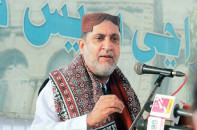How will the govt form judicial panel in Balochistan?
All senior judges in the province will be retired on September 5, leaving no one to fill their positions.

The counsel for government of Punjab Shahid Hamid raised this issue at the end of Thursday’s proceedings while reminding the court that the issue of confirmation of additional judges of Balochistan High Court is coming up on September 4, therefore the government under Article 267-A of the Constitution should call parliament’s session to debate the issue.
“How will the new judges be appointed in the Balochistan High Court under the new system? On September 5, the tenure of all judges would be completed...there will be no senior judge in Balochistan High Court... then how will the judicial commission be formed?” were the questions the CJP asked the AG to explain at the next hearing.
“We pointed out this issue in the beginning and the government has no solution to this problem,” Justice Jawad
S Khawaja observed.
“The Supreme Court has the jurisdiction to issue orders for the judges of the Balochistan High Court but we want parliament to solve this issue,” Justice Tassaduq Jilani remarked.
Earlier in the morning, chairman of Pakistan Bar Council Nasrullah Waraich, while resuming his arguments before the 17-member larger bench of the Supreme Court, pleaded that the SC has already decided in its various judgments that the appointment of judges is the job of the executive.
While giving reference to the famous July 31 verdict of the Supreme Court, Waraich contended that the court wrote in its decision that the consent of the prime minster and chief ministers would also be obligatory for the appointment of judges.
The parliamentary committee will exercise powers of the executive for the appointment of top judges, and if it is so, where is the separation of the judiciary from the executive, the CJP asked.
Waraich said the independence of the judiciary was impossible without the lawyers’ movement. However the lawyers are also dissatisfied with the recent appointments of judges.
“This is absolutely wrong. Not even a single appointment of judge has been challenged in the court of law,” the CJP remarked. “Because the lawyers respect judges, those appointments were not challenged,” Waraich replied.
Referring to the speech of Abdul Hafeez Pirzada in 1975 when he was the law minister, Waraich said that Pirzada spoke in favour of the 5th amendment in the past which is totally against his today’s stance.
“He was then law minister of Pakistan People’s Party and his speech was a reflection of his party’s policy,” Justice Jawad S Khawaja remarked.
“Pirzada said that the voice of parliament is final and he supported the amendment regarding judges’ appointments and today he (Pirzada) in the Supreme Court says that parliament has no right to amend the constitution,” Waraich said.
Another federation’s lawyer Salahuddin Gandapur resumed his arguments and pleaded: “We should keep history in our mind”.“We have kept the history in our mind to the extent that we have changed our geography,” retorted Justice Javed Iqbal.The old method of appointment of judges has never been declared wrong in the judgment, Justice Ramday observed.
Following Gandapur, when another counsel Iftikhar-ul-Haq appeared on the rostrum, Justice Saqib Nisar asked how many lawyers the federation has hired in this case?
The court later adjourned the hearing till Monday.
Published in The Express Tribune, August 13th, 2010.



















COMMENTS
Comments are moderated and generally will be posted if they are on-topic and not abusive.
For more information, please see our Comments FAQ